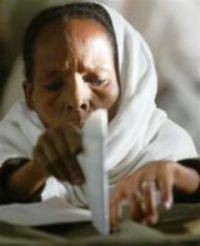Repression largely practised to obstruct free local elections in Ethiopia – WRH
April 11, 2008 (NEW YORK) — The Ethiopian government’s repression of registered opposition parties and ordinary voters has largely prevented political competition ahead of local elections that begin on April 13, Human Rights Watch said today.
 These widespread acts of violence, arbitrary detention and intimidation mirror long-term patterns of abuse designed to suppress political dissent in Ethiopia.
These widespread acts of violence, arbitrary detention and intimidation mirror long-term patterns of abuse designed to suppress political dissent in Ethiopia.
Human Rights Watch carried out two weeks of field research, mainly in Oromia, during the run-up to the polls and documented systemic patterns of repression and abuse that have rendered the elections meaningless in many areas.
Oromia is Ethiopia’s most populous region and one long troubled by heavy-handed government repression.
The nationwide elections for the kebele (village or neighborhood councils), and wereda (districts made up of several kebeles administrations), are crucially important. It is local officials who are responsible for much of the day-to-day repression that characterizes governance in Ethiopia.
Many local officials in Oromia have made a routine practice of justifying their abuses by accusing law-abiding government critics of belonging to the outlawed Oromo Liberation Front (OLF), which is waging a low-level insurrection against the government.
Candidates allied with the ruling Ethiopian People’s Revolutionary Democratic Front (EPRDF) “will run unopposed in the vast majority of constituencies across Ethiopia.”HRW said.
On April 10, one of Ethiopia’s two major opposition coalitions, the United Ethiopian Democratic Forces (UEDF), pulled out of the process altogether.
UEDF commands 50 seats in the 547-member Ethiopian parliament and had been planning to field about 20,000 candidates for various local-level posts. While the ruling Ethiopian Peoples Revolutionary Democratic Front has some 4 million candidates running.
UEDF officials complained that intimidation and procedural irregularities limited registration to only 6,000 of the 20,000 candidates they attempted to put forward for various seats. By contrast, state-controlled media reports that the EPRDF will field more than 4 million candidates across the country.
Local ruling party officials have systematically targeted opposition candidates for violence, intimidation, and other human rights abuses since the registration period began three months ago.
“Since there was no level field for a democratic election and our candidates were beaten, arrested and their property confiscated by cadres of the ruling party, we have decided to pull out of the local council elections,” UEDF Chairman Beyene Petros said.
HRW said officials across the three level of the local government cooperate in these campaigns of repression and intimidation.
According to the rights watchdog, some victims were arbitrarily detained and then interrogated or threatened by wereda administration officials in the presence of zonal officials. Others were arbitrarily detained by wereda police and then transferred to the custody to zonal security officials or federal soldiers.
Local authorities have also prevented the registration of opposition candidates in many constituencies where the opposition’s success in 2005 parliamentary polls appeared to give them a chance at winning.
The report cites Fincha in western Oromia for the candidate of the OPC. Further the opposition Oromo Federalist Democratic Movement (OFDM) has encountered similar problems in western Oromia, with 10 of its 14 candidates resigning in response to pressure from local officials.
HRW also accused the ruling party of using unjustifiable bureaucratic and procedural bars on free opposition participation in the polls. It also said that some representatives of the National Electoral Board (NEB) responsible for the registration of candidates at the constituency level have worked with local officials to block opposition registration.
In some cases NEB agents have cancelled the registration of opposition candidates either without explanation or based on age and residency criteria despite clear evidence to the contrary. In other instances, NEB representatives provided the names of opposition candidates to local officials and to the police. Police in some of those constituencies then cordoned off access to NEB offices and physically prevented suspected opposition candidates from entering.
Ethiopia’s last elections were parliamentary polls in 2005. The run-up to the elections saw signs of openness in some areas, though in most constituencies the same patterns of repression documented above prevailed.
Following the elections, opposition efforts to contest the results sparked a heavy-handed government crackdown that saw several hundred people gunned down in the streets of Addis Ababa, mass arrests of perceived opposition supporters, and several prominent opposition leaders jailed on charges of treason that were ultimately dropped.
(ST)
